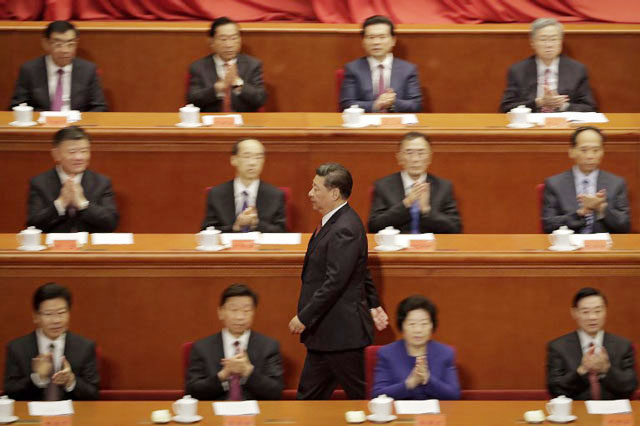
Beijing, China | Xinhua | A skilled baker with seven years of experience, Abudujilil Tuhtey can make 500 to 600 pieces of naan every day. It’s a staple food popular in northwest China’s Xinjiang Uygur Autonomous Region.
With his outstanding skill, Tuhtey can earn more than 5,000 yuan (about 769 U.S. dollars) a month at a naan bakery in Akto County in southern Xinjiang, which was opened this year as part of the government’s efforts to alleviate poverty by developing local specialty businesses.
Thanks to better equipment and modern techniques, the bakery can make 20,000 pieces of naan every day. Some 300 poor people have benefited from the thriving business, making an average monthly salary of about 4,000 yuan, said Ajim Mamut, head of the bakery.
The success of the bakery offered a glimpse into how targeted anti-poverty measures work in China, and how remote and less developed regions can capitalize on their strengths to shake off poverty.
In November, Akto, one of the westernmost counties in China where a large ethnic minority population lives, was delisted from the national poverty list along with nine other counties in Xinjiang.
Nationwide, China removed the remaining 52 counties from the poverty list as scheduled this year, despite the unprecedented impacts brought about by the COVID-19 epidemic. The counties are scattered in Xinjiang, Ningxia Hui Autonomous Region, Guangxi Zhuang Autonomous Region and the provinces of Yunnan, Sichuan, Guizhou and Gansu.
“Delisting all poverty-stricken counties indicates China has resolved the millennia-old issue of extreme poverty,” said Gao Gang, a researcher with the Guizhou Academy of Social Sciences.
The hard-won feat came after decades of unremitting efforts in the world’s most populous country. Since its reform and opening up in the late 1970s, China has lifted more than 700 million people out of poverty.
In particular, since the 18th National Congress of the Communist Party of China in late 2012, the country’s remaining poor population of nearly 100 million under the current standard have shaken off poverty, and all of its 832 poverty-stricken counties have been delisted.
ENHANCED SENSE OF ACCOMPLISHMENT
China’s anti-poverty campaign has not only greatly improved the livelihood of poor people, but also helped induce a much-coveted sense of fulfillment and gain.
Huang Yuanping, 33, is a resident of Yunding Village, Xiangxi Tujia and Miao Autonomous Prefecture, central China’s Hunan Province.
Bearing the responsibility of her ailing father-in-law and two children, Huang had long been tied to household chores and struggled to make ends meet. In 2014, her family was registered as a poor household.
The local government sent a team of three people to the village to help with the poverty-alleviation work in 2018. Upon arrival, they were as much struck by the picturesque scenery of the village as by its abysmal level of poverty. After thorough research, they reckoned that developing tourism was the best way to lift the mountainous village out of poverty.
After two years of efforts by the prefectural government, tourism-related infrastructure in the village was improved — more roads were built, solar-powered street lamps installed, and dilapidated houses turned into hostels.
This year, a recreational campground was built in the village for travelers where Huang got the job of a front desk clerk, earning a monthly salary of 2,800 yuan.
“I used to be a housewife. Now with the new job, I feel a sense of self-fulfillment,” said Huang. “I can learn a lot of things while making enough money to support the family.”
“As the village is becoming an increasingly popular tourist attraction, I believe my life will become better and better,” said Huang.
HIGH SATISFACTION RATE
China sets its national standard of extreme poverty based on per capita income and other factors such as living conditions and access to compulsory education, basic medicare and safe housing.
Before a county is officially removed from the poverty list, experts from third-party agencies would conduct an assessment on whether the criteria for delisting have been met and how satisfied the poor people are with the anti-poverty work.
Pang Jiaxing, an environmental expert from Lanzhou University who has been an assessor of anti-poverty work since 2016, said the assessment follows a set of strict scientific rules.
“During the assessment, we gathered information from both the officials and poor people. We also took field trips to see in person whether poverty-alleviation criteria have been met,” said Pang. “Whenever there was an inconsistency between what we knew and what the poor people said, we sought opinions from their neighbors.”
In recent years, the satisfaction rate of the poor people with anti-poverty work has continued to increase, reflecting that such efforts brought them genuine benefits, according to Pang and his team.
In both Guizhou and Tibet Autonomous Region, third-party assessments found the satisfaction rate among locals over 99 percent.
The elimination of extreme poverty means China has met the poverty eradication target set out in the 2030 Agenda for Sustainable Development of the United Nations 10 years ahead of schedule.
UN Secretary-General Antonio Guterres said in his message for the 2017 Global Poverty Reduction and Development Forum that “targeted poverty reduction strategies are the only way to reach those farthest behind and achieve the ambitious targets set out in the 2030 Agenda.”
“China has lifted hundreds of millions of people out of poverty, and its experiences can provide valuable lessons to other developing countries,” he said.
(Reporting by Zhou Erjie, Zhang Zhongkai, Li Laifang, Zhang Yujie, Gu Yu, Zhang Wenjing, Wu Si, Ainura; Video reporters: Lu Ying, Cao Li, Ding Chunyu, Cheng Ji’an; Video editor: Liu Yuting)■
 The Independent Uganda: You get the Truth we Pay the Price
The Independent Uganda: You get the Truth we Pay the Price



